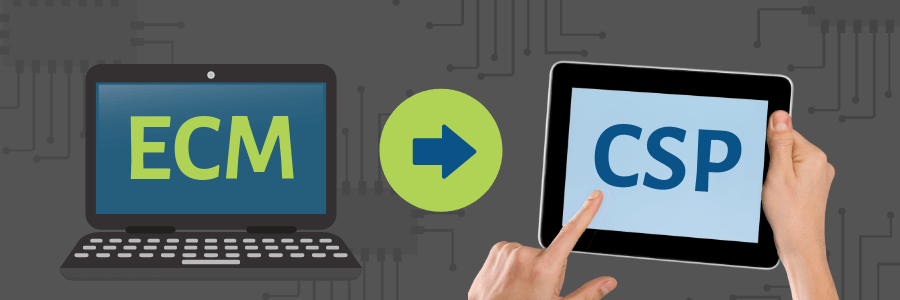When Gartner came out with a statement claiming that “ECM is dead” and that they would be using the term CSP (content services platform) or “content services” to replace the former terminology “ECM” (enterprise content management), there was confusion.
Are the concepts that different that they need distinction? The answer is yes; even though the concepts of ECM and content services are supposed to accomplish the same things, the change has to do with the core infrastructure of a company and how enterprise compliance and system integrations can be made easier. Not to mention that the importance of the terminology of these strategies lies in the need for consistency, especially when it comes to the rapidly-changing technological landscape.
Content Services Vs. Enterprise Content Management
So, what’s so different about these two concepts? The content management functionalities between the two concepts don’t differ; both focus on workflow, business process automation, data capture, analytics, governance, and data classification, among others.
But the meaning of ECM evolved as the need for storing content on one platform began to dwindle. How organizations manage their content based on their particular initiatives became more important than how and where the content was being stored.
Although CSPs are often defined by a suite of cloud services or microservices under one umbrella with multiple applications sharing repositories, the fact that they are on the cloud makes it quick and easy to adapt to new data sources without the need to be constantly migrating and integrating new services into your system. With so many businesses moving to the cloud, it’s important that your business is not only able to connect to them but can do so as effortlessly as possible. According to Gartner:
“The Content Services approach overrules the notion of consolidation for its own sake. It’s strategic, rather than technology oriented and provides an evolved way of thinking about how to solve content related problems. It blends the reality of what is happening now in the digital enterprise and the emerging technology of the near future.”
The “near future” might be closer than you think as the rate of content generation is increasing exponentially. Businesses have realized that mining their content and turning it into actionable data is absolutely central to overall success. To put into perspective how impactful this realization has been:
%
of world data was generated in the last 2 years
%
of data is unstructured
%
of time is wasted searching for documents
The Shift from ECM to Content Services
The importance of this shift doesn’t come down to just the terminology—it’s more about acknowledging the changing times and the different needs and expectations that businesses now have for content management. It’s an indicator that business needs are evolving, and technology has to continue to evolve with them.
We’re at a point in technology where businesses are ramping up the amount of data generated to get better insights into business processes but are still working towards wrangling and making sense of these huge amounts of content. This is why the overall concept of content management had to change: to help businesses realize the challenge of the definition of ECM and that this new definition of content services can solve those problems.
In order to keep up with business’ evolving needs, technology companies are following Gartner’s lead and defining their content services in a broader way. Gartner predicts that by 2020, “15% of enterprises will have dropped their traditional ECM provider in favor of a provider that offers consumer-like content services.”
Additionally, they predict that by the same year, “20% of major EFSS [enterprise file synchronicity and sharing] and ECM vendors will morph their existing offerings into content service platforms.” Many companies are already abandoning the term “ECM.” For example, AIIM has defined the following as “Intelligent Information Management”:
- Rationalizing and modernizing the information infrastructure
- Digitalizing the core infrastructure
- Automating compliance and governance
- Leveraging analytics and machine learning
The New Content Management
As you can see, the newer definitions of content management seem to prioritize the versatility of content management and how they can benefit specific enterprise-wide initiatives as opposed to ECM which tends to prioritize the consolidation of content, which sometimes is not beneficial to a company at all. Don’t get too sad about “ECM” leaving us; “content services” will prove to be even more efficient in managing your content.
Want to learn more about content services? Subscribe to our blog!

Layne Alfred
Marketing Associate

